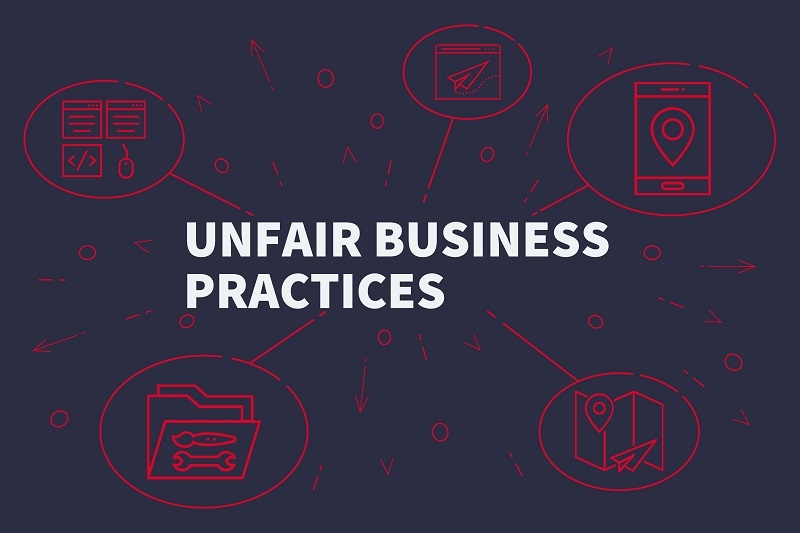
When you purchase a product or consume a service, you expect fair treatment. Unfortunately, not every company operates with the highest standards of integrity. A few indulge in an unprincipled trading system, sometimes affecting customers financially or emotionally. Knowing how to identify these immoderations and how to act properly can safeguard not only yourself but also other consumers.
This guide will explain typical indications of unfair business actions, methods of submitting consumer complaints, and the different legal remedies.
Unfair business practices are actions that a company takes to trick customers or to benefit from them without giving them the right. Misleading advertisements, surprise charges, lying about products, or not giving in to the promise of guarantees, are some of the examples of unfair business actions. Precisely, they happen when a business is involved in such things that are against fairness and honesty just to increase sales.
Say, a mobile data company can advertise "unlimited data" and then reduce your speed considerably after using only a few hundred megabytes. A car dealership could be adding hidden fees to your loan without letting you know. This is clearly an unethical business behavior. The next step to safeguarding your rights is to identify such strategies.
Here are some common unfair practices to be aware of:
Sometimes companies do so to make household items seem better than they really are or to conceal certain facts in tiny letters. It deceives customers who then buy under pressure.
The shop may show off one cheap product to bring in customers, yet when they come, it is no longer there. Instead, they recommend a more costly product to the buyers.
Secret fees are always part of the travel packages, bank accounts, or even subscription services.
Instances of not following through with what was agreed upon can be found in many situations - the online retailer who doesn't ship your order, or the contractor who didn't finish the job.
Alongside the use of deception and lies to force payment, some companies utilize harsh tactics to pressure consumers even when they have good reasons for not paying.
These are all unfair practices that depict how businesses can exploit customers. The quickest way to react before the damage escalates is to catch them.
If you take no action against the unfair treatment, then it is likely that businesses will continue with their harmful actions. By reporting fraud or raising concerns, you become a part of the process that makes companies answerable to the public. Consumer reports are very important for regulatory agencies to decide upon the patterns of abuse. So by being vocal, you are not only helping the victims but also yourself.
Furthermore, in lots of instances, there are laws designed to protect consumers from these sorts of abuses. Such regulations may require businesses to compensate the customers or even halt the bad activities. Your voice will not only be heard by filing consumer complaints, but also there is a possibility of further future protections becoming stronger because of it.
No legal training is needed to identify questionable activity. Watch for these warning signs each time you are in the market:
Training to identify these traits equips you to stay clear of being tricked by unjust commercial routines right at the start.
Try to solve it face-to-face before going through the movement. Practical steps are like these:
Hold on to receipts, emails, advertisements, or contracts if they indicate that a business has misdirected you.
Situations often result from errors rather than intentional acts. Hence, by communicating directly, you may resolve the issue.
Remember all phone calls and save all letters. This is essential documentation if official consumer complaints are required.
If the company rejects or refuses to comply with your request, you can turn to more formal avenues.

If you have been treated unfairly, then there exist multiple avenues for you to take action.
Apart from the United States, other countries also have government departments that are deeply concerned about the interests of consumers. They carry out investigations into unethical commercial practices and may, as a consequence, impose fines or order refunds, etc.
In several places, one can report scams through official websites. The steps to be followed in the process are clearly explained by the platforms.
In the case of financial services, telecom, or healthcare, there are certain regulators who supervise the activities of organizations. The submission of a report to these bodies allows the appropriate individuals to examine your matter.
Consumer-friendly organizations help consumers write their complaints and achieve a fair outcome.
The greater usage of these programs increases the probability that your complaint will prompt an adjustment.
Perhaps you are considering going to court if your options for reporting your issue have not obtained a satisfying response. There may be a few factors to choose from, but some examples of legal remedies include:
Depending on the situation, it may take some time and the assistance of a lawyer to pursue these alternatives, but they do provide better protection for when companies decide that being ethical just isn’t an option.
Just knowing the correct ways to respond to drops in fortunes is significant, but prevention is even more desirable. Below are several hints:
By making these small changes, you are considerably less likely to fall prey to unfair business actions.
Single voice complaints can make a difference, yet community action you mobilize achieve much more impact. As more consumers write reviews online, lodge complaints with watchdogs, or participate in campaign activities, the harder it gets for companies to ignore the message and continue business as usual. Geographical areas where there are common voices acting in tandem not only form a stronger front but also are a better protection for all.
In addition to that, businesses with no scruples will still go on if people who know about such practices keep quiet. By taking action, you are not only protecting yourself but also making the market fairer for all consumers.
Dealing with lying companies can be very annoying, but you still have power. Learning what unfair business practices are is very helpful to you in the process of spotting when a company is doing wrong. Making people participate in collecting proof, filing complaints against bad businesses, and obtaining legal solutions gives you a better chance to be heard.
The most important thing is that one must always be vigilant and have the courage to speak up and make the businesses aware that honesty and fairness are not their choice but rather a default.
This content was created by AI